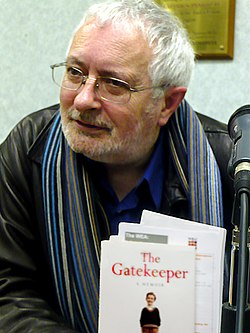Terry Eagleton Quote
Language, the unconscious, the parents, the symbolic order: these terms in Lacan are not exactly synonymous, but they are intimately allied. They are sometimes spoken of by him as the ‘Other’ — as that which like language is always anterior to us and will always escape us, that which brought us into being as subjects in the first place but which always outruns our grasp. We have seen that for Lacan our unconscious desire is directed towards this Other, in the shape of some ultimately gratifying reality which we can never have; but it is also true for Lacan that our desire is in some way always received from the Other too. We desire what others — our parents, for instance — unconsciously desire for us; and desire can only happen because we are caught up in linguistic, sexual and social relations — the whole field of the ‘Other’ — which generate it.
Language, the unconscious, the parents, the symbolic order: these terms in Lacan are not exactly synonymous, but they are intimately allied. They are sometimes spoken of by him as the ‘Other’ — as that which like language is always anterior to us and will always escape us, that which brought us into being as subjects in the first place but which always outruns our grasp. We have seen that for Lacan our unconscious desire is directed towards this Other, in the shape of some ultimately gratifying reality which we can never have; but it is also true for Lacan that our desire is in some way always received from the Other too. We desire what others — our parents, for instance — unconsciously desire for us; and desire can only happen because we are caught up in linguistic, sexual and social relations — the whole field of the ‘Other’ — which generate it.
Related Quotes
About Terry Eagleton
Eagleton has published over forty books, but remains best known for Literary Theory: An Introduction (1983), which has sold over 750,000 copies. The work elucidated the emerging literary theory of the period, as well as arguing that all literary theory is necessarily political. He has also been a prominent critic of postmodernism, publishing works such as The Illusions of Postmodernism (1996) and After Theory (2003). He argues that, influenced by postmodernism, cultural theory has wrongly devalued objectivity and ethics. His thinking is influenced by Marxism and Christianity.
Formerly the Thomas Warton Professor of English Literature at the University of Oxford (1992–2001) and John Edward Taylor Professor of Cultural Theory at the University of Manchester (2001–2008), Eagleton has held visiting appointments at universities around the world including Cornell, Duke, Iowa, Melbourne, Trinity College Dublin, and Yale.
Eagleton delivered Yale University's 2008 Terry Lectures and the University of Edinburgh's 2010 Gifford Lecture entitled The God Debate. He gave the 2010 Richard Price Memorial Lecture at Newington Green Unitarian Church, speaking on "The New Atheism and the War on Terror". In 2009, he published a book which accompanied his lectures on religion, entitled Reason, Faith, and Revolution: Reflections on the God Debate.
In July 2024, Eagleton was awarded an Honorary Doctorate by Lancaster University.
